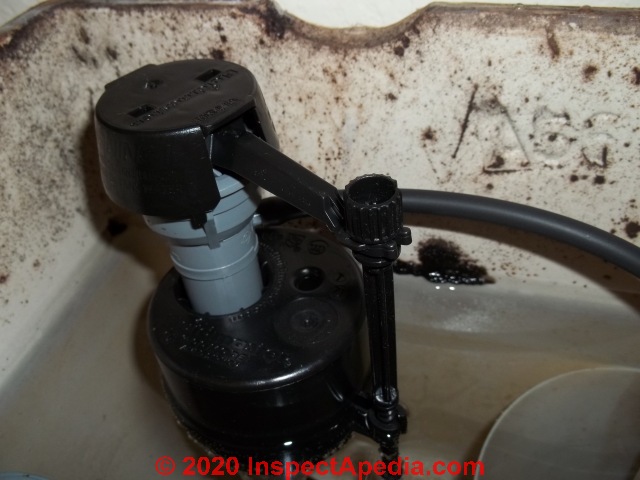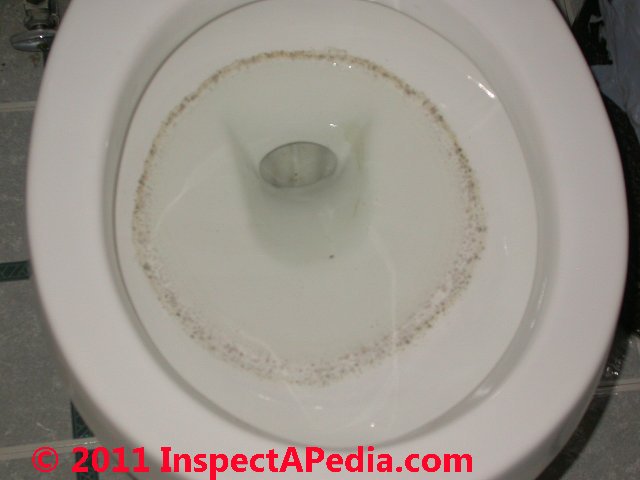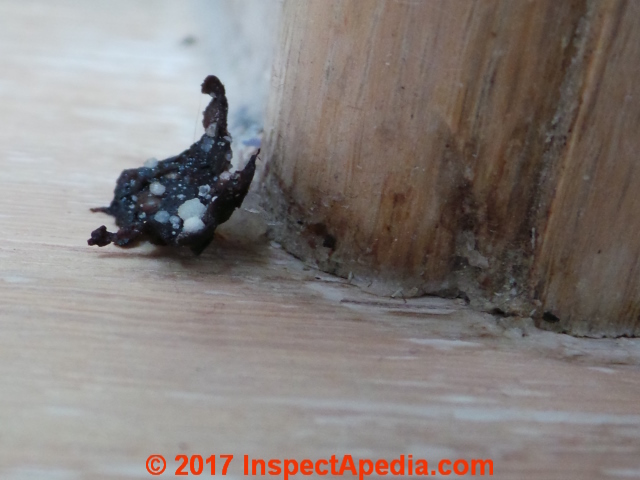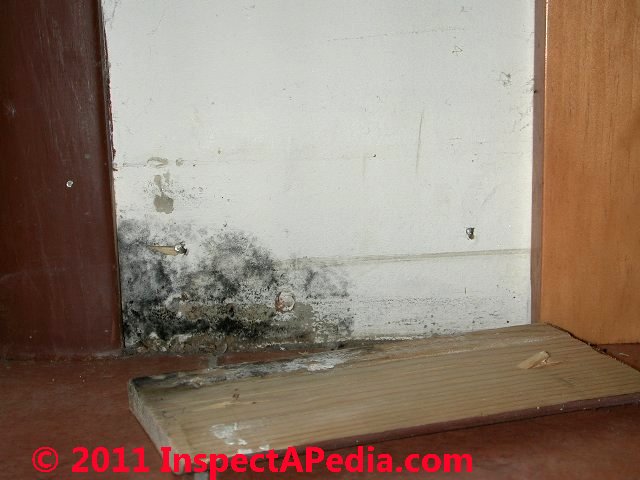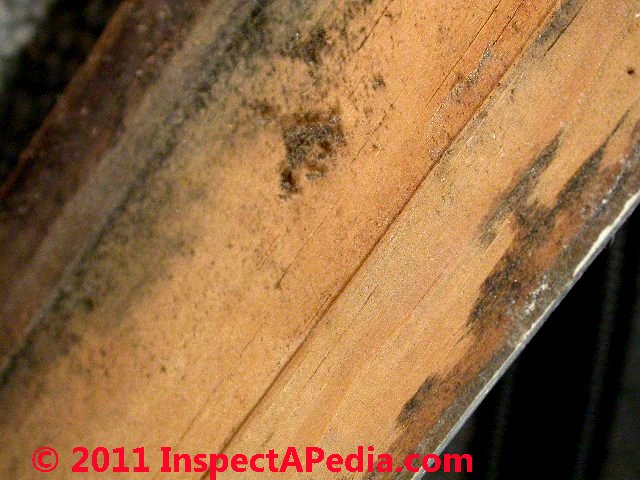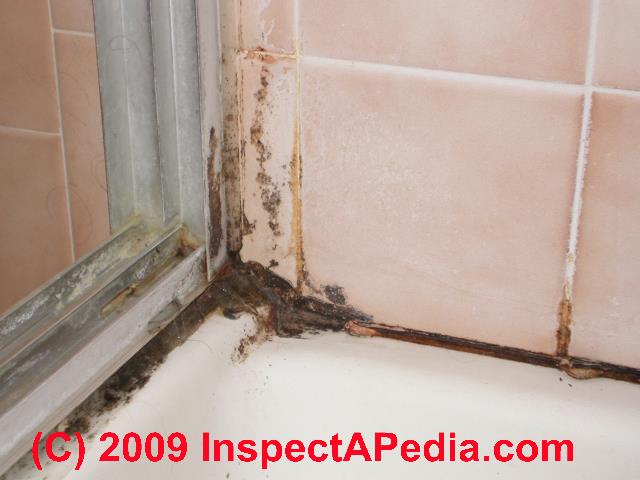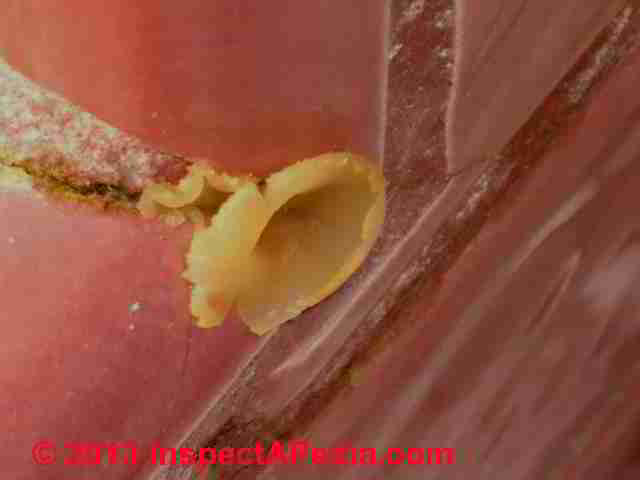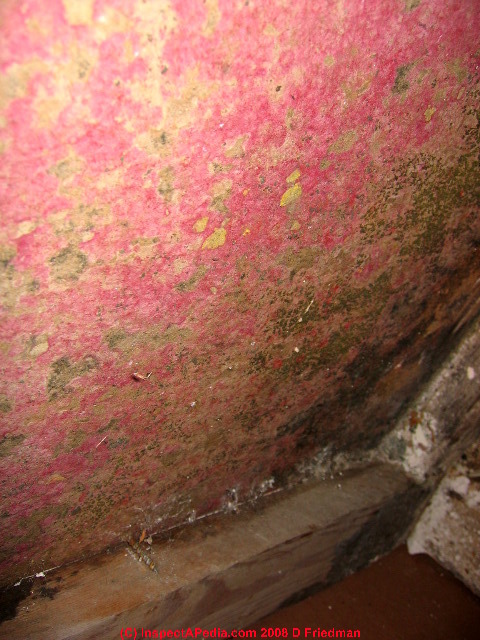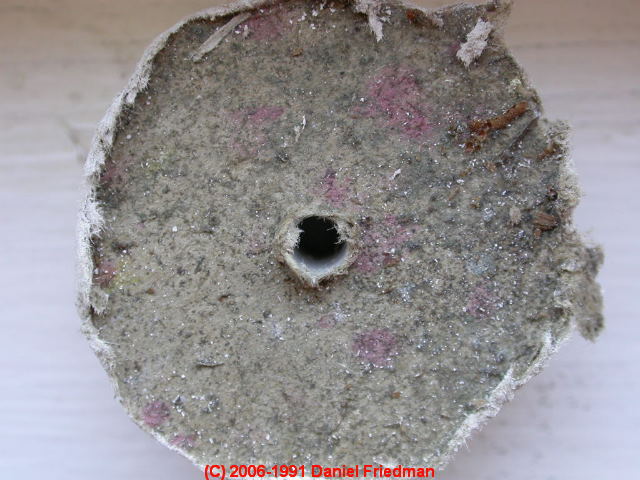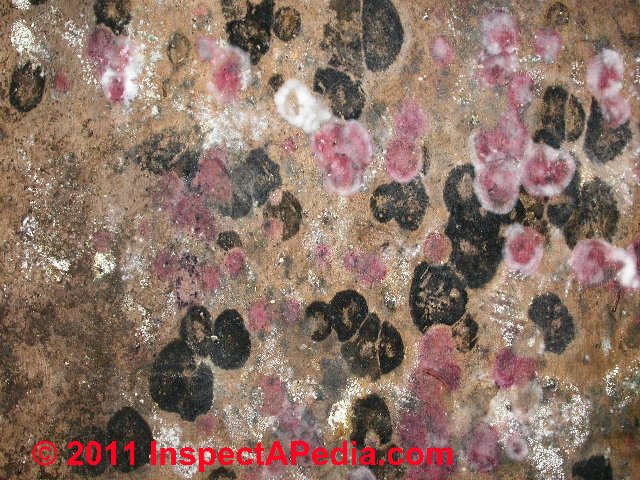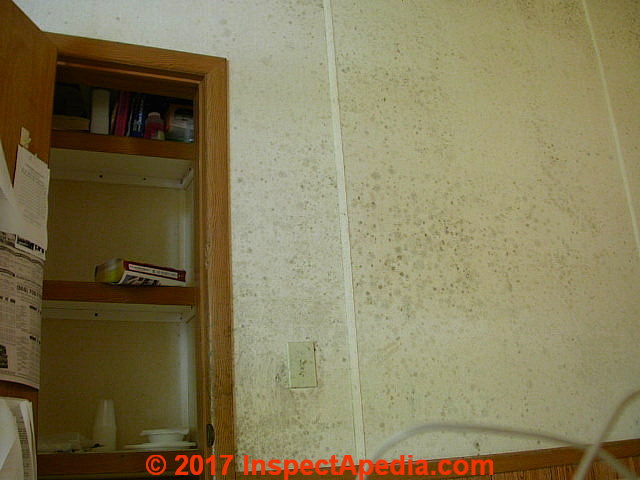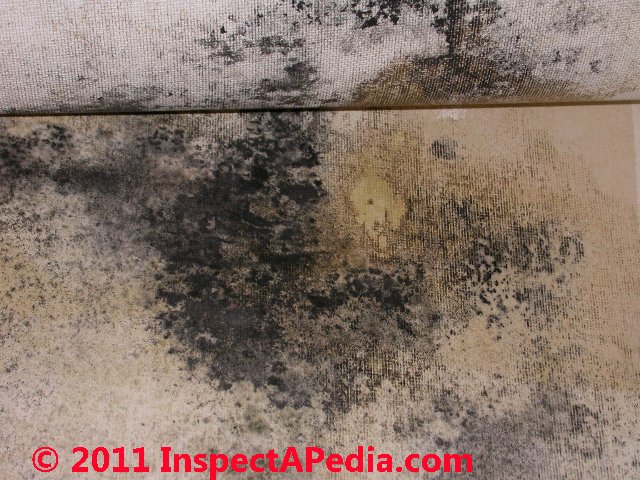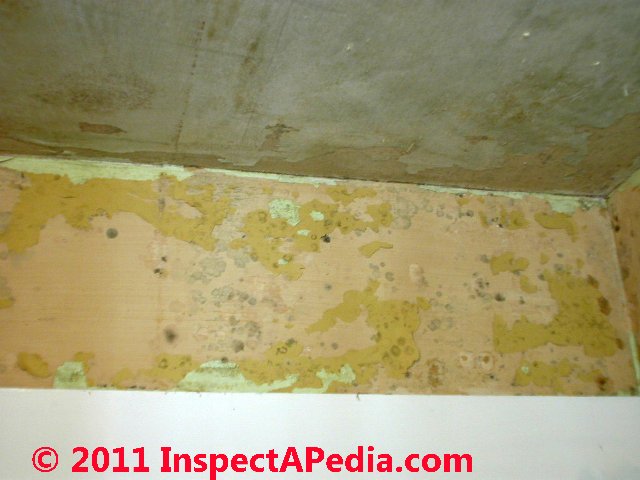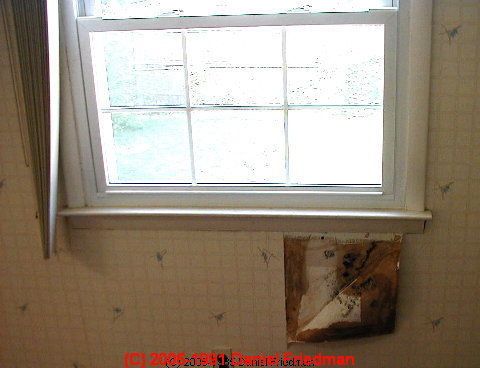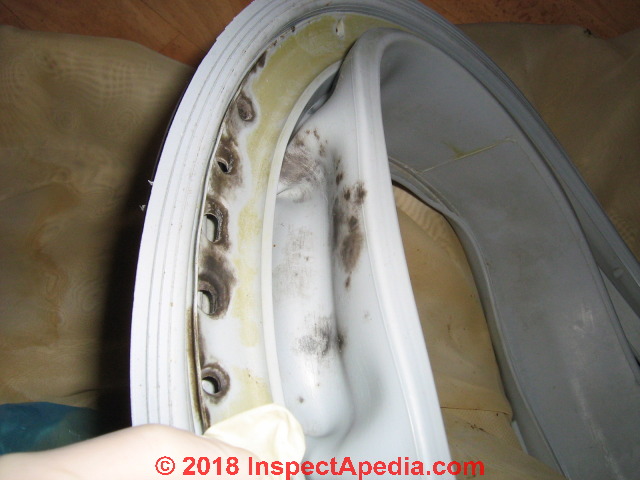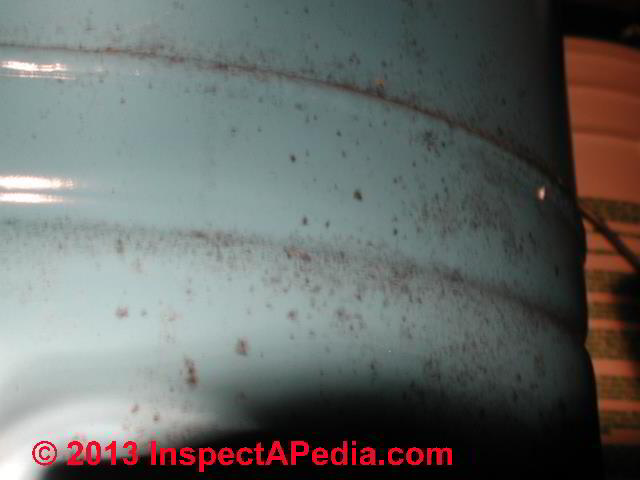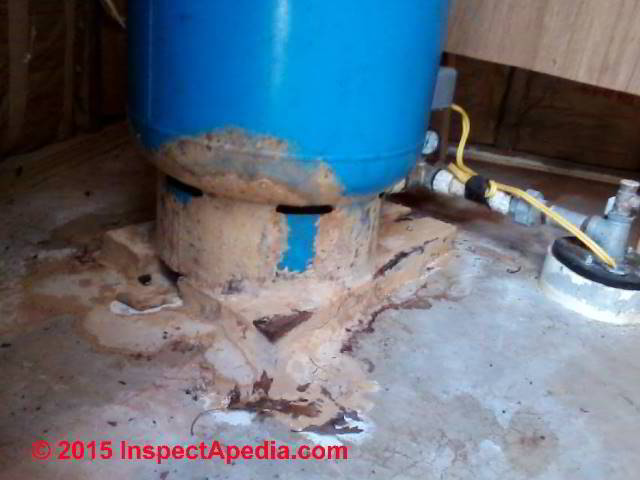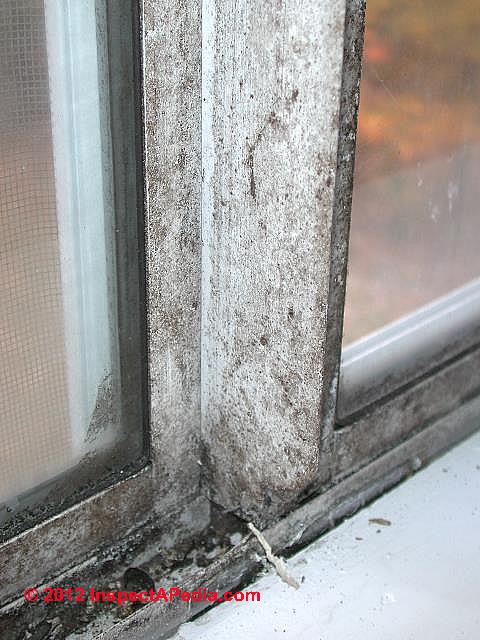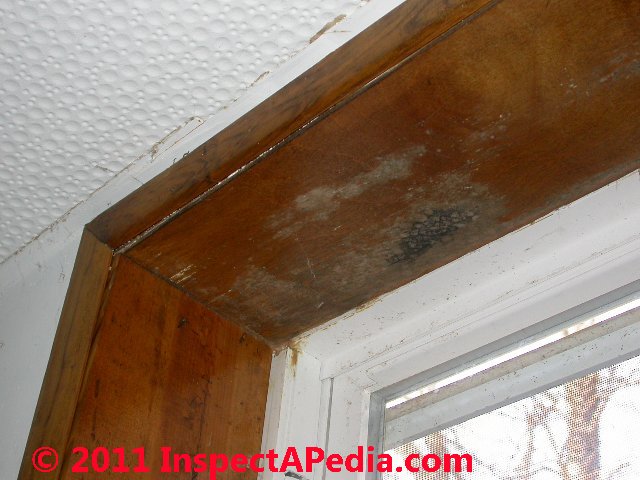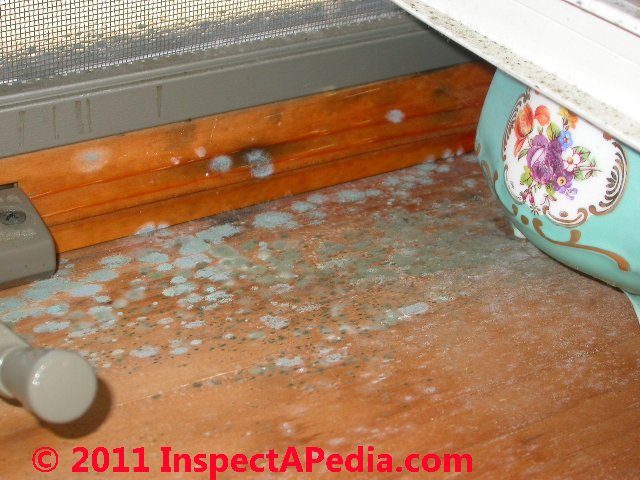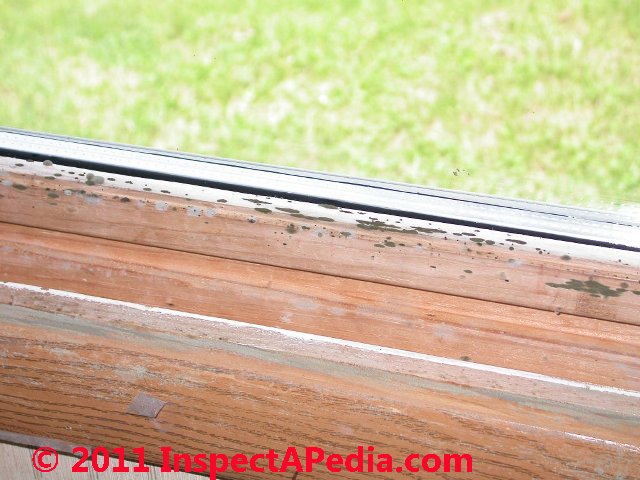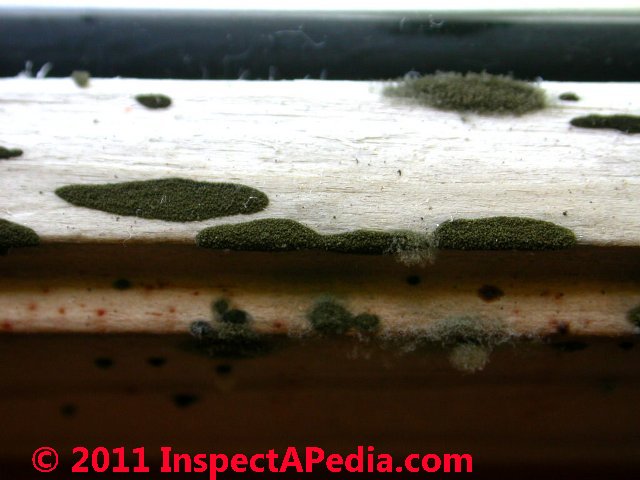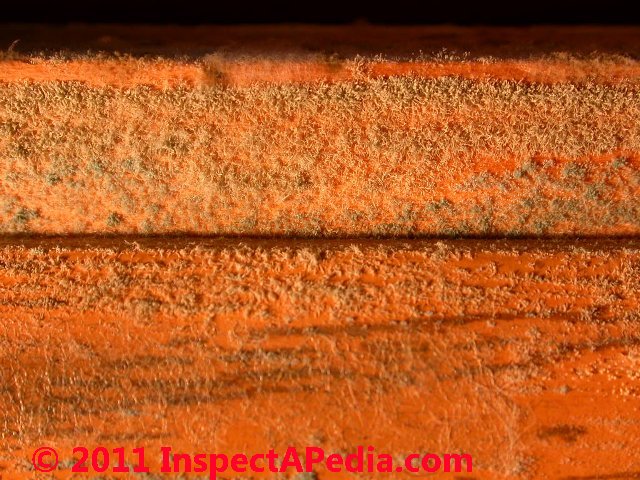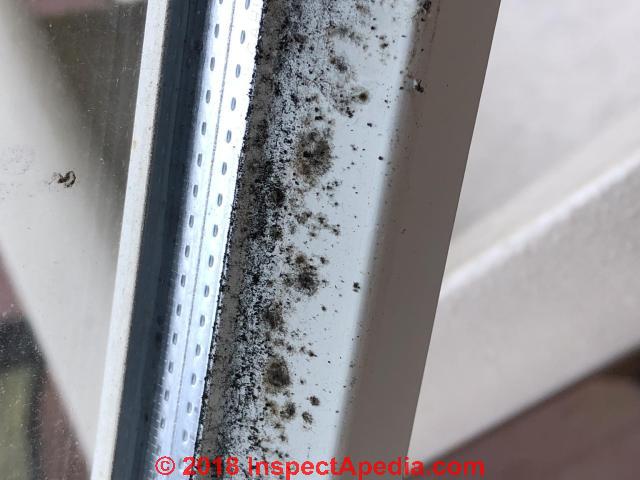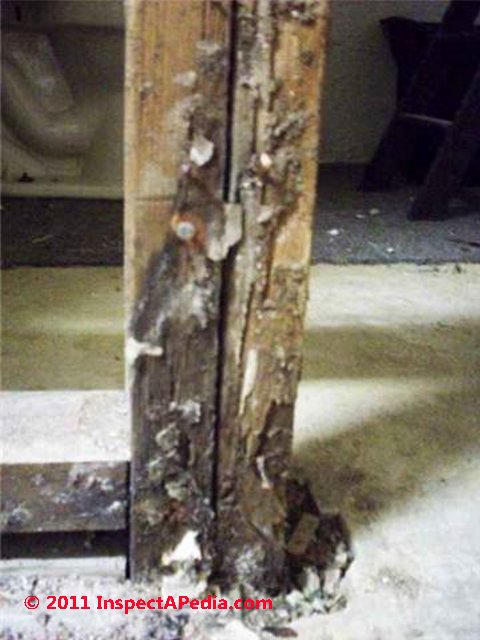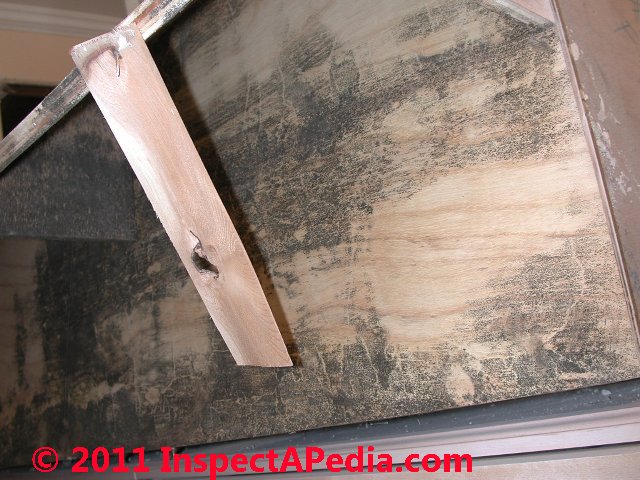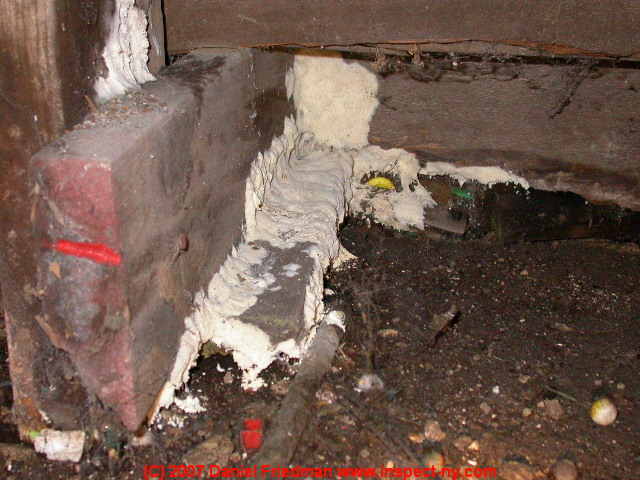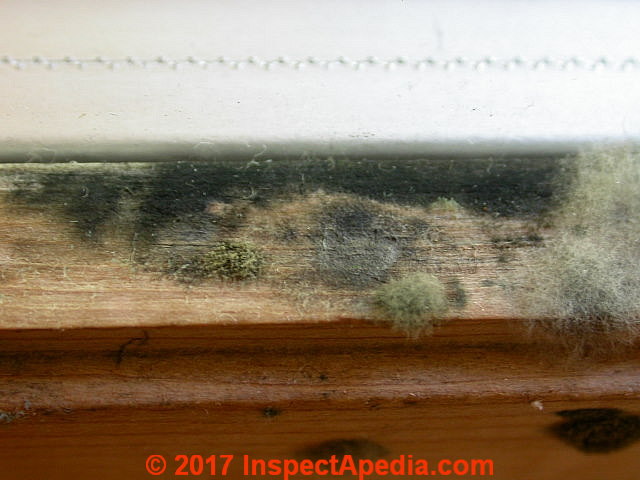 Mold In-Situ: Photos of Mold on Surfaces - Group 10
Mold In-Situ: Photos of Mold on Surfaces - Group 10
Appearance of Mold on Different Materials & Surfaces.
- POST a QUESTION or COMMENT about what mold looks like in buildings, including mobile homes and trailers
Photographs of mold growth in buildings:
A photo guide to mold on wood trim, mold on tubs, mold on tile grout, mold on caulk, mold on sealant, mold on vinyl windows, mold in wall cavities, mold on wallpaper, mold in water, mold on water, mold on water heaters, mold in water heaters, mold on water tanks, mold on windows, mold on window trim, mold on wood surfaces.
Page top photo: at least two mold genera/species growing on wood surfaces around a window inside of a U.S. home.
We provide an online reference photo library of various kinds of mold as it is found growing on a wide range of surfaces and materials found on or in buildings. These photos of mold on indoor various materials or "mold growth substrates" may help you recognize mold in buildings, recognize probably-cosmetic mold, and recognize stuff that is not mold and does not need to be tested.
InspectAPedia tolerates no conflicts of interest. We have no relationship with advertisers, products, or services discussed at this website.
- Daniel Friedman, Publisher/Editor/Author - See WHO ARE WE?
Pictures of Mold on Various Building Surfaces and Materials
Here we illustrate what mold looks like on various building surfaces & materials as well as on items often found in buildings, including foods, fruits, vegetables, even water.
Use the link
MOLD APPEARANCE on VARIOUS SURFACES - INDEX
to return to the index / list of photographs of the appearance of mold on various building materials & contents.
--- MOLD GROWTH on MATERIAL SURFACES PHOTOS GROUP 10 ---
- MOLD on TOILETS URINALS & OTHER PLUMBING FIXTURES
- MOLD on TORTILLA CHIPS
- MOLD on TRIM, WOOD
- MOLD on TUB & TILE GROUT & CAULK
- MOLD on VINYL WINDOWS
- MOLD in / on WALL CAVITY SURFACES
- MOLD on WALLBOARD & LAMINATES
- MOLD on WALLPAPER
- MOLD on WASHING MACHINE GASKETS
- MOLD on WATER, un-sweetened lemon-water
- MOLD on WATER HEATERS
- MOLD on WATER TANKS
- MOLD on WOOD WALKING STICKS / CANES
- MOLD on WINDOWS, TRIM
- MOLD on WOOD Surfaces, Other
Photographs of mould found on the surface of items, materials, & surfaces found indoors
[Click to enlarge any image]
Mold on Toilets, Urinals, Plumbing Fixtures
Above: this dark brown and black mold growing in the toilet cistern or toilet tank can simply be cleaned using a household cleanser or dilute bleach solution.
Mold growth in the interior of a toilet cistern or tank: simply cleaning with a household cleaner is in order but if the toilet is running - sometimes a cause of mold growth on condensation surfaces - then the flush valve may also need replacement.
Photo above courtesy of an InspectApedia.com reader.
Below: a ring of dark mold often grows at the top of the water level in a toilet bowl, particularly if the toilet is not in regular use.
I thnk that organic debris on the porcelain surface is encourage mold growth in this location.
Also see MOLD on PORECELAIN SURFACES
Also see BATHROOM MOLD
Mold on Tortillas - Blue Corn Chips or Tortilla Chips
It's no surprise that there are mold genera/species, often including species of Aspergillus or Penicillium that will grow on many food items.
This moldy blue corn chip photo was contributed by an InspectApedia reader. Notice the water stains on the door jamb trim where the corn chip is resting.There may be mold growth on the hidden surfaces of floor trim in this area.
Mold on Trim, Wood
Our first moldy wood trim photos (above and below) show severe mold contamination on indoor wood trim at a door (below left) and in a wet basement (below right).

Below we illustrate black mold growth on drywall that was exposed when we removed wood trim to check wall conditions following a wet floor that was soaked due to a burst toilet tank.
Finding this mold less than 24-hours after the leak event indicated that this mold was almost certainly pre-existing condition. We traced a leak to a trim opening on the exterior of this wall.
Next, continujing below, we illustrate a common condition found on the back of wood floor molding: a combination of house dust and debris, water stains, and mold along the bottom edge (upper left in our photo).
...
Mold may be hidden behind trim boards regardless of the trim composition itself, as we show here. Stachybotrys toxic black mold was found on drywall behind a laundry room baseboard. If this is all that's present this is a trivial cleanup and does not need testing and remediation.
Also see our photo of mushrooms growing out of floor trim at MOLD on FLOOR TRIM
Mold on Tub & Tile Caulk & Grout
...
Here is a link to more photos of MOLD on BATHROOM SURFACES
See BATHROOM MOLD for more details about removing or preventing mold on bathroom surfaces including tile and tile grout.
Mold on Vinyl Windows
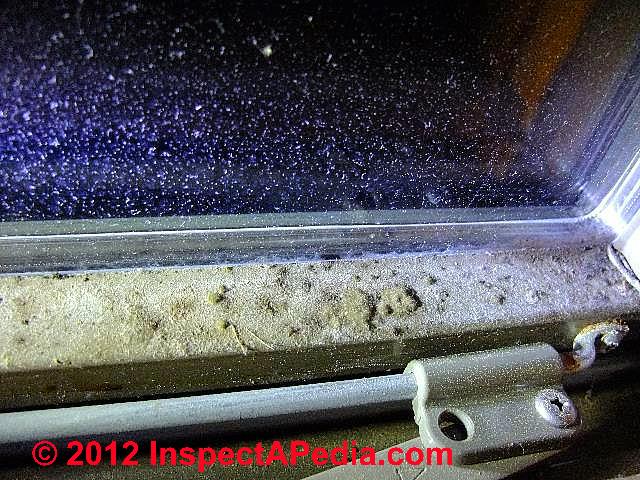
We took the moldy vinyl window sash photo (left) at night so that you could see quite easily that this window was in a dusty location. The site contains both heavy house dust (fabric fibers and skin cells) and thick growth of mold that was present in olive green, as well as darker black (not shown).
Other windows in this home did not show this mold growth, even other windows in the same room. What was different? This window is located directly above a bed, and was often left open at night.
We pose that a combination of inoculation from outdoor air movement and more significantly, a heavy deposit of house dust that contains organics, and still more important, higher levels of condensation on this window (people slept right below) were key contributing factors to this growth. The repair: clean the surfaces more frequently, using ordinary household cleaners.
See more mold photos of window mold
You can cure these window mold problems by following advice found
at CONDENSATION on WINDOWS, SKYLIGHTS
Mold In or On Wall Cavity Surfaces
In building wall cavities that have been wet, we often find mold growth on the wall-cavity side of drywall, wood, insulation, exterior wall sheathing.
At above left are several molds, dominated by a red yeast, on the cavity side of drywall in a wet area.
See RED MOLD PHOTOS [ article]
More subtle is the dark green and black mold on the wall cavity side of our test cut plug (above right) taken low on the surface of a wall where we suspected there had been leakage even though the room side of the drywall looked perfectly clean.
See TEST CUTS for MOLD in BUILDING CAVITIES [article]
The potpourri of mold genera / species in our photo at above left (identified in our lab) included at least five different molds, some of them harmful (Stachybotrys chartarum, Aspergillus sp.)
This severe mold contamination covered all of the cavity-side of drywall covered walls in a home where, following a wetting event, the insurance company's contractor had used an ineffective "water extraction" method that consisted of drilling holes along the wall top and bottom to blow air through the cavity.
In my [DF] opinion, this approach simply could not remove the water quickly enough to prevent mold growth after the job was marked as "completed".
See HIDDEN MOLD in CEILINGS / WALLS [technical article]
Mold on Wallboard & Plastic or Fiberglass or Hardboard Laminate Panels
Below you will note extensive mold growth on the surfaces of wallboard in this older New York home.
Also see MOLD on COUNTERTOPS & counter undersides
Also see MOLD on PANELING, WOOD
Mold on Wallpaper & mold on drywall hidden behind wallpaper
Below you can see photographs of moldy wallpaper in a bathroom shower.
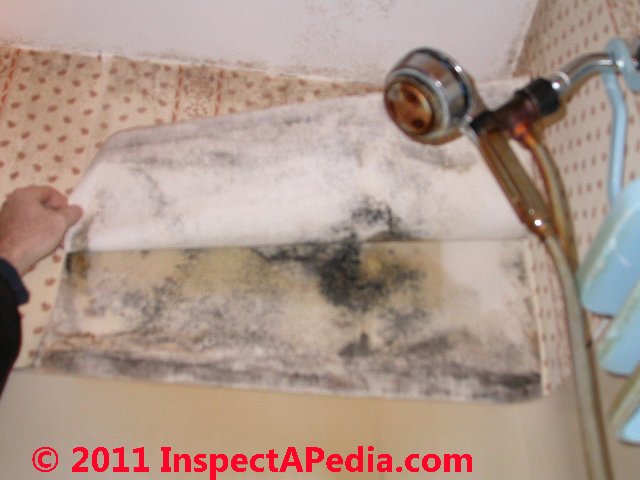
Below we show Stachybotrys chartarum black mold that was found on the hidden side of wallpaper below this leaky window in a Maple Shade New Jersey condominium. Lab identification was, of course, required.
We discuss the window leak that caused this mold, its extent, and what was done about it, in more detail
at DRYWALL MOLD TESTING.
Just below is a melange of mold growths on the wall and ceiling of a pre-1900 home.
Below is mold found on the back side of wallpaper beneath a leaky window sill of a Cherry Hill New Jersey condominium. (Thanks Michelle).
Mold on Wooden Walking Sticks, Canes

Shown above and below, these two walking sticks were stored inside of a jeep into which a small amount of water leaked and was left unattended for nine months.
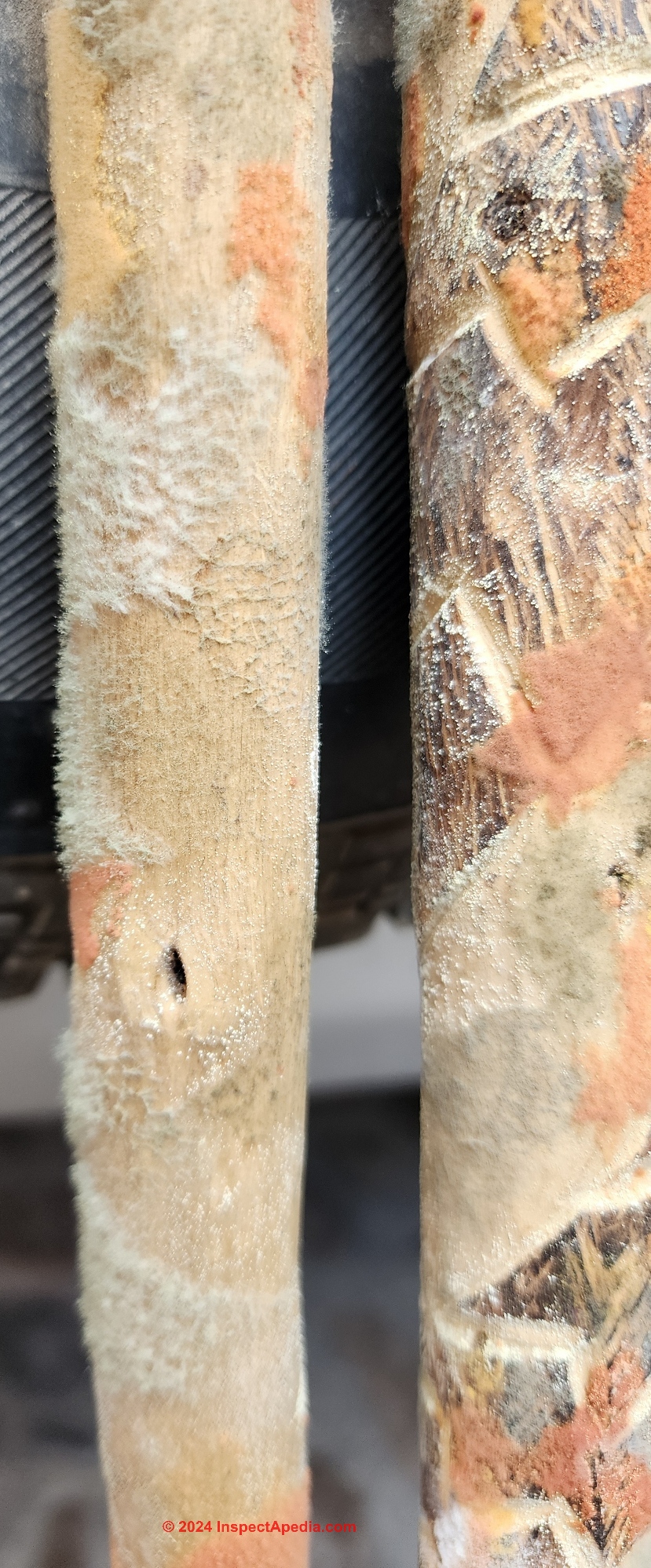
It's apparent from the texture and color variations that we're probably seeing multiple mold genera/species on these wooden canes, perhaps including several species of Aspergillus, Penicillium, or other damp or wet wood-loving fungi.
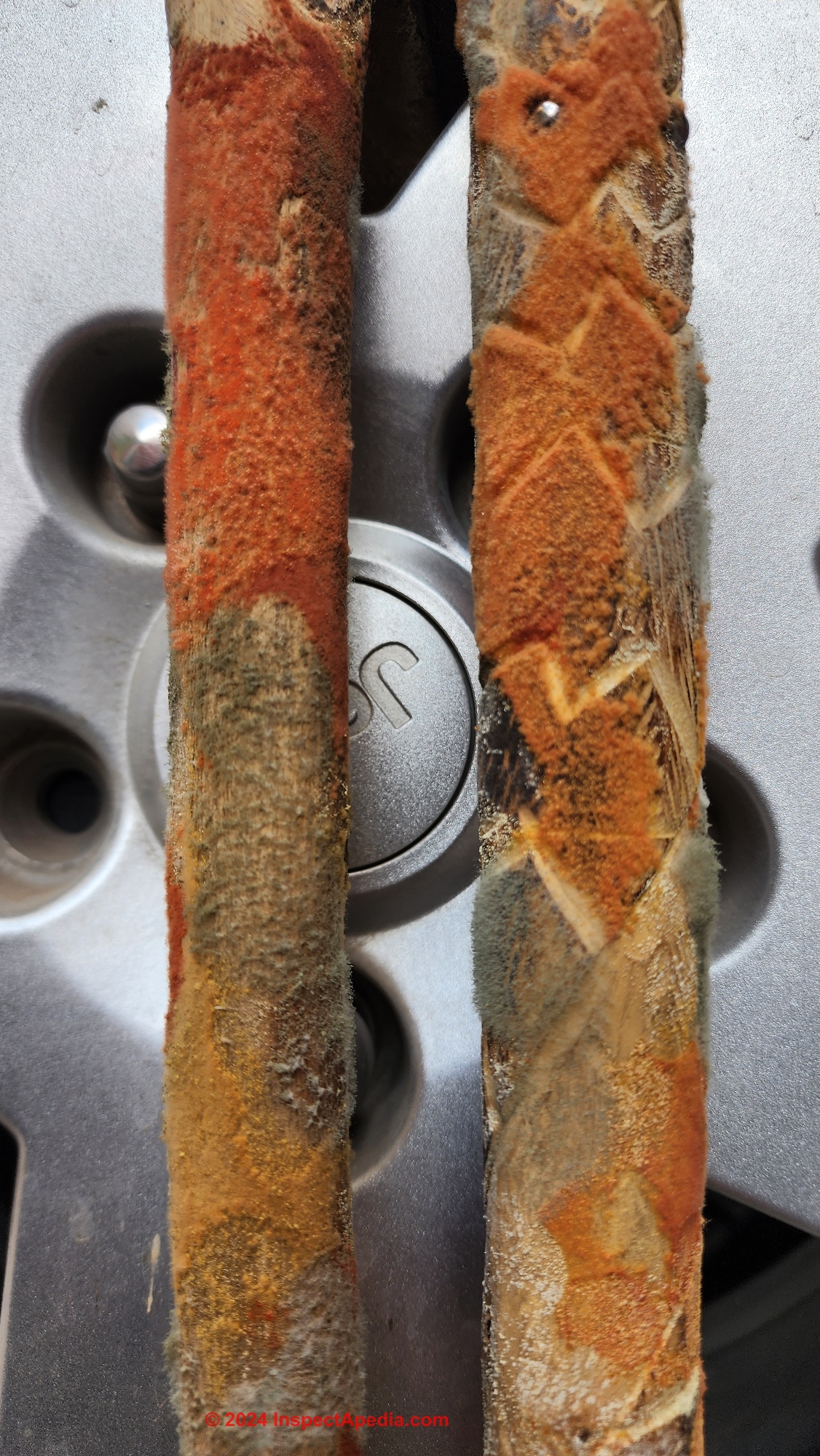
We cleaned these wooden canes with a spray household cleaner that contained a bleach solution, followed by clean water, followed by thorough drying outdoors.
Mold on Washing Machine Gaskets & Doors
Above: mold on a clothes washing machine door and door gasket of a U.K. home, contributed by reader Monica M.
Mold Floating on Water - un-sweetened lemon water
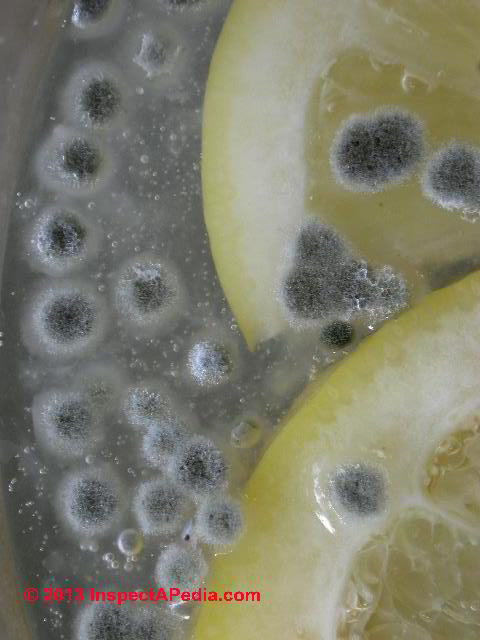
...
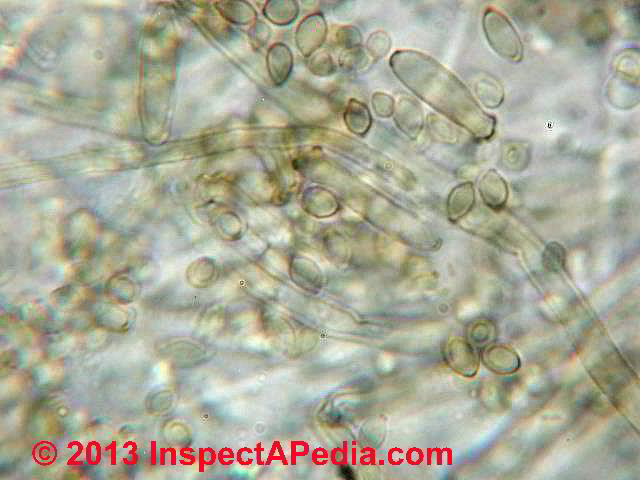
The fungus shown above was growing as a slimy gray-green colony floating in un-sweetened water that had added a few thin slices of lemon. At right we see that the mold is a species of Cladosporium. More photos of moldy food and information about Mycotoxicosis are
at MOLD EXPOSURE, FOOD HAZARDS.
Mold on the Exterior of Water Heaters vs Mold Contamination inside Water Heaters or Geysers

This photograph illustrates mold growth on the sides of a water heater located in a wet, moldy basement.
For a discussion of mold contamination that can occur inside water heaters or geysers
see Legionella BACTERIA in WATER HEATERS
Mold on Water Pressure Tanks or Water Storage Tanks
[Click to enlarge any image]
Thephotograph at abve left illustrates a common occurrence of mold growth on the sides of a water tank.
Mold growth on the sides of a painted water pressure tank is common as the surface is often wet by condensation; the genera, species, and total quantity of mold present on just the tank surface will not be a health concern except for the generally smart advice of "don't wipe your finger on a dirty surface and then rub it in your eye."
The thick yellow-tan mold growth on the water tank and its base shown in the photo above occurred at a water pressure tank whose image was submitted by a reader [private email] located in central Georgia in the U.S. - a humid locale.
While a lab test would be required to identify the genera species of this mold, it looks like a basidiomycete. We can see that it likes growing in a wet area on both painted surfaces and what may be wooden blocks atop which the water pressure tank rests.
I'd remove this mold using any household cleaner, then see what you can do to correct any leaks or moisture entry into the space.
Condensate on the pressure tank could itself be a component in this problem, especially if the tank and controls are in a small un-ventilated space. Rather than venting this enclosed space I'd dehumidify it.
Watch out: when you see fungal growth like this on an indoor surface you should be alert for other hidden mold reservoirs caused by the same wet or damp conditions.
See FIBERGLASS INSULATION MOLD
Mold on Windows, Trim
A leak from above led to mold growth on the top of this window jamb. Hidden mold in the ceiling and wall are likely (below left). Our second photo shows a common mold event: growth on window muntins, probably due to condensation on the window glass. But this window mold was more extensive than usual.
...
At below left we illustrate a very moldy window sill in a home that had been exposed to unattended flooding. At below right we show the first of three moldy window sash photographs that indicate chronic or prolonged exposure to wet, moldy conditions.
...
Below we show close ups of mold found on the window shown abov.
...
Below: heavy dark mold growth on what I think is a vinyl-trimmed window; photo provided by reader T in a Q&A posted
In my opinion the total size of this window mold reservoir - if this is all of the mold contamination in the building) is not significant; the mold should be cleaned-off using any household cleaner; reducing indoor moisture can reduce the rate of mold growth on the window trim.
Mold will grow on window surfaces of most materials: wood, painted wood, vinyl or other plastics, even painted steel; you may also find some mold, often Ulocladium, growing on a fine layer of organic dust and debris right on the window glass itself.
See examples of that at MOLD on GLASS SURFACES
More examples of mold growth on windows is
See CONDENSATION on WINDOWS, SKYLIGHTS [technical article]
Mold on Wood Surfaces, Other
The black mold found on wood framing (floor joist at below left and wall studs at below right) is an indicator of chronic wet conditions and neither of these cases are likely to
be BLACK COSMETIC MOLD that we find on some new framing lumber.
See BLACK MOLD, TOXIC & ALLERGENIC
Below we illustrate a fabulous fungal colony growing on a wood sill set in wet dirt in a New York Basement. The sill is supporting a basement stairway.
Also see WOOD I-JOIST & TRUSS MOLD CONTAMINATION
Below: fungal growth, the fruiting body of some molds, shown as an extensive growth on a wood shingled exterior wall.
These fungal-contaminated wood shingles are discussed in detail
at MOLD & FUNGUS on WOOD SIDING: CLEAN & PREVENT
CONTACT us to submit photographs of mold growth on other man-made or building-related materials.
...
Continue reading at MOLD GROWTH on SURFACES, PHOTOS - topic home, or select a topic from the closely-related articles below, or see the complete ARTICLE INDEX.
Or see these
Mold Identification Articles
- BLACK MOLD, HARMLESS
- MOLD APPEARANCE on VARIOUS SURFACES index to photos of mold on all kinds of surfaces and materials
- MOLD APPEARANCE - WHAT MOLD LOOKS LIKE - home
- MOLD APPEARANCE - STUFF THAT IS NOT MOLD
- MOLD ATLAS & PARTICLES INDEX
- MOLD FREQUENCY in BUILDINGS
- MOLD in BUILDINGS
- MOLD CONTAMINATION IN BUILDINGS - home
- MOLD by MICROSCOPE - mold under the microscope
- MOLD in the PETRI DISH, PHOTOS - mold on culture plates or in culture-type mold test kits
- MOLD RELATED ILLNESS SYMPTOMS
Suggested citation for this web page
MOLD GROWTH on SURFACES, PHOTOS_GROUP_10 at InspectApedia.com - online encyclopedia of building & environmental inspection, testing, diagnosis, repair, & problem prevention advice.
Or see this
INDEX to RELATED ARTICLES: ARTICLE INDEX to MOLD CONTAMINATION & REMEDIATION
Or use the SEARCH BOX found below to Ask a Question or Search InspectApedia
Ask a Question or Search InspectApedia
Try the search box just below, or if you prefer, post a question or comment in the Comments box below and we will respond promptly.
Search the InspectApedia website
Note: appearance of your Comment below may be delayed: if your comment contains an image, photograph, web link, or text that looks to the software as if it might be a web link, your posting will appear after it has been approved by a moderator. Apologies for the delay.
Only one image can be added per comment but you can post as many comments, and therefore images, as you like.
You will not receive a notification when a response to your question has been posted.
Please bookmark this page to make it easy for you to check back for our response.
IF above you see "Comment Form is loading comments..." then COMMENT BOX - countable.ca / bawkbox.com IS NOT WORKING.
In any case you are welcome to send an email directly to us at InspectApedia.com at editor@inspectApedia.com
We'll reply to you directly. Please help us help you by noting, in your email, the URL of the InspectApedia page where you wanted to comment.
Citations & References
In addition to any citations in the article above, a full list is available on request.
- In addition to citations & references found in this article, see the research citations given at the end of the related articles found at our suggested
CONTINUE READING or RECOMMENDED ARTICLES.
- Carson, Dunlop & Associates Ltd., 120 Carlton Street Suite 407, Toronto ON M5A 4K2. Tel: (416) 964-9415 1-800-268-7070 Email: info@carsondunlop.com. Alan Carson is a past president of ASHI, the American Society of Home Inspectors.
Thanks to Alan Carson and Bob Dunlop, for permission for InspectAPedia to use text excerpts from The HOME REFERENCE BOOK - the Encyclopedia of Homes and to use illustrations from The ILLUSTRATED HOME .
Carson Dunlop Associates provides extensive home inspection education and report writing material. In gratitude we provide links to tsome Carson Dunlop Associates products and services.


